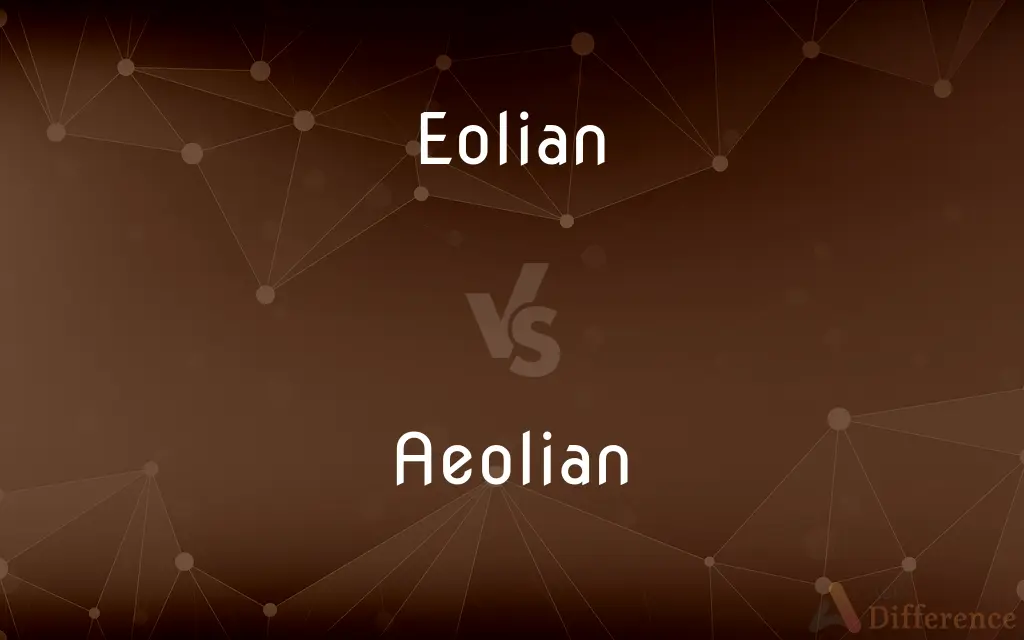Eolian vs. Aeolian — What's the Difference?
By Maham Liaqat & Fiza Rafique — Updated on April 17, 2024
Eolian refers to wind-related geological processes, like the creation of dunes, while Aeolian pertains to wind but often specifically links to music, such as the Aeolian mode in Western music.

Difference Between Eolian and Aeolian
Table of Contents
ADVERTISEMENT
Key Differences
Eolian processes involve the transportation and deposition of sediment by wind, leading to features like sand dunes and loess deposits. Whereas Aeolian, in a musical context, refers to a mode in Western music that is equivalent to the natural minor scale, affecting melody construction and harmonic mood.
Eolian landscapes are typically found in desert environments where wind erosion and deposition are dominant geological forces. On the other hand, Aeolian music can be found in various cultural and historical contexts, influencing the emotional and aesthetic aspects of compositions.
Eolian features are critical for understanding desertification and other environmental changes. Whereas Aeolian harmonies and scales play a key role in the development of Western musical theory and practice.
Eolian studies help scientists predict changes in earth’s surface and manage land in arid regions effectively. While Aeolian music theory assists musicians and composers in creating pieces that convey a wide range of emotional tones.
Eolian forces shape the physical geography of Earth's arid regions, creating unique and dynamic landscapes. Meanwhile, Aeolian influences in music shape the soundscapes of compositions, providing depth and nuance to musical works.
ADVERTISEMENT
Comparison Chart
Definition
Pertaining to wind-driven processes
Pertaining to the Aeolian mode in music
Primary Context
Geology
Music Theory
Key Features
Sand dunes, loess deposits
Natural minor scale, melancholic mood
Environmental Impact
Influences landscape formation and erosion
N/A
Cultural Significance
Studied in environmental and earth sciences
Influential in the development of Western music
Compare with Definitions
Eolian
Pertaining to wind.
Eolian sand deposits shape the desert landscape.
Aeolian
Impacting mood in music compositions.
Aeolian tones can deeply affect the emotional impact of a song.
Eolian
Related to wind-driven geological activity.
Eolian processes are critical for creating natural sand sculptures.
Aeolian
Related to natural minor musical scale.
Aeolian mode is often used for composing somber themes.
Eolian
Impacting by wind erosion.
Eolian erosion can drastically alter the surface of arid lands.
Aeolian
Influencing Western musical theory.
Aeolian harmonies are fundamental in classical compositions.
Eolian
Associated with wind's geological influence.
Eolian features dominate the topography of many deserts.
Aeolian
Pertaining to the Aeolian mode in music.
Aeolian scales give a melancholic tone to musical pieces.
Eolian
Involving the transport of materials by wind.
Eolian transport mechanisms distribute nutrients across various ecosystems.
Aeolian
Associated with musical tonality.
Aeolian characteristics dictate the flow and feel of many popular songs.
Eolian
Relating to, caused by, or carried by the wind.
Aeolian
Of or relating to Aeolis or its people or culture.
Eolian
Alternative spelling of aeolian
Aeolian
Greek Mythology Of or relating to Aeolus.
Eolian
Æolian.
Aeolian
Aeolian Variant of eolian.
Eolian
Formed, or deposited, by the action of wind, as dunes.
Aeolian
One of a Hellenic people of central Greece that occupied Aeolis and Lesbos around 1100 BC.
Eolian
A member of one of the four divisions of the prehistoric Greeks
Aeolian
See Aeolic.
Aeolian
Of, or relating to the wind.
Aeolian
(geology) carried, deposited or eroded by the wind.
Aeolian
(music) Aeolian mode
Aeolian
A lightweight fabric with a ribbed surface, generally made by combining silk and cotton, or silk and worsted warp and weft.
Aeolian
Of or pertaining to Æolia or Æolis, in Asia Minor, colonized by the Greeks, or to its inhabitants; æolic; as, the Æolian dialect.
Aeolian
Pertaining to Æolus, the mythic god of the winds; aërial.
Viewless forms the æolian organ play.
Aeolian
Relating to or caused by wind.
Aeolian
A member of one of the four divisions of the prehistoric Greeks.
Aeolian
A member of one of the four divisions of the prehistoric Greeks
Aeolian
Relating to or caused by wind
Aeolian
Of or pertaining to Aeolus, the Greek god of the winds
Common Curiosities
What is the Aeolian mode in music?
The Aeolian mode is a musical scale that corresponds to the natural minor scale in Western music, characterized by a specific pattern of whole and half steps.
How does Aeolian music theory influence composition?
Aeolian music theory helps composers develop melodies and harmonies that convey specific emotional tones, typically somber or melancholic.
What types of landscapes are typically Eolian?
Eolian landscapes typically include deserts, beaches, and any arid regions where wind has a significant impact on landforms.
What emotional effects are associated with Aeolian music?
Aeolian music often evokes feelings of sadness or introspection due to its minor tonality and somber melodic choices.
Are there any practical applications of understanding Eolian processes?
Yes, understanding Eolian processes is crucial for environmental planning, disaster mitigation, and in the construction and maintenance of structures in wind-prone areas.
What are the challenges in studying Eolian environments?
Challenges include the remote and harsh conditions of many Eolian environments, as well as the slow and subtle nature of changes in these landscapes.
Can Eolian processes be observed in urban areas?
Yes, Eolian processes can be observed in urban areas, especially in regions prone to strong winds where sand and dust can accumulate or cause damage.
What is the significance of studying Eolian processes?
Studying Eolian processes is important for understanding environmental changes, managing natural resources, and predicting future landscape transformations.
What are Eolian processes?
Eolian processes refer to the geological activities influenced by wind, such as erosion, transport, and deposition of sediments.
How do Eolian features affect the environment?
Eolian features like dunes and loess plains can influence local climates, ecosystems, and even agriculture by altering landscapes and soil distribution.
Can the Aeolian mode be blended with other modes in music?
Yes, musicians often blend the Aeolian mode with other modes to create complex and rich musical textures and narratives.
How can one identify Aeolian features in music?
Aeolian features in music can be identified by their use of the natural minor scale and the emotional depth typically associated with this mode.
Is the Aeolian mode used in modern music?
Yes, the Aeolian mode is widely used in various genres of modern music, including rock, jazz, and classical, to evoke specific emotional responses.
What tools are used to study Eolian processes?
Tools like satellite imagery, drones, and sediment analysis are commonly used to study and monitor Eolian processes.
How does the Aeolian mode compare to other musical modes?
The Aeolian mode is unique in that it corresponds to the natural minor scale, making it distinctive in its emotional expression compared to other, more upbeat or complex modes.
Share Your Discovery

Previous Comparison
Initiative vs. Innovation
Next Comparison
Covenant vs. VowAuthor Spotlight
Written by
Maham LiaqatCo-written by
Fiza RafiqueFiza Rafique is a skilled content writer at AskDifference.com, where she meticulously refines and enhances written pieces. Drawing from her vast editorial expertise, Fiza ensures clarity, accuracy, and precision in every article. Passionate about language, she continually seeks to elevate the quality of content for readers worldwide.














































